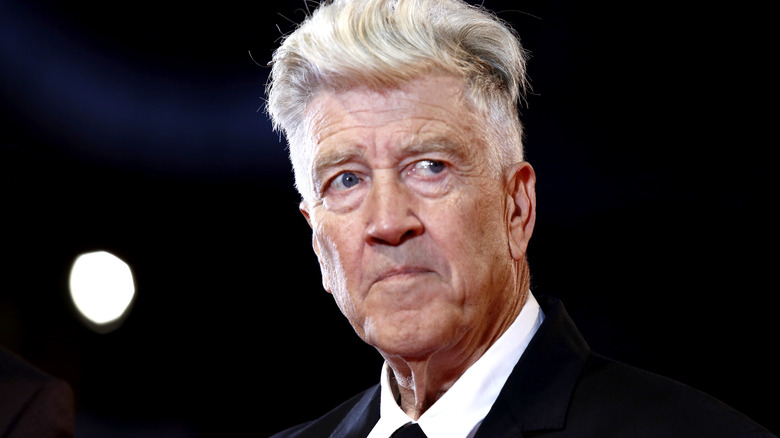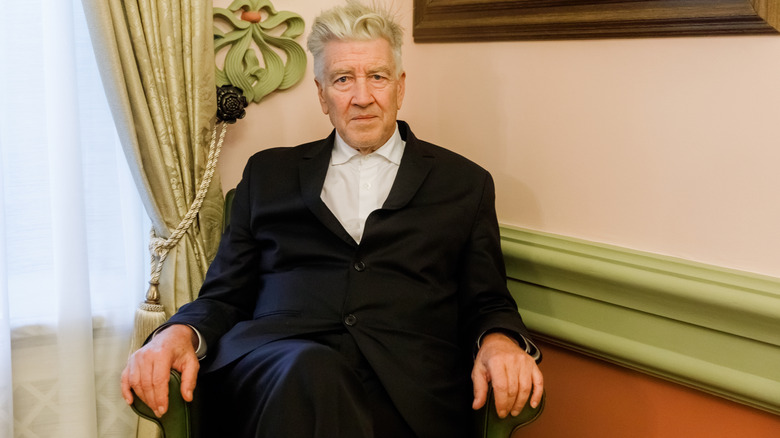David Lynch's Embrace Of CGI Was As Controversial As Everything Else He Made
Few directors have made their mark on cinema like David Lynch. The venerated filmmaker, who passed away on January 16, 2025, was so prolific in his work and so singular in its vision that he joined the ranks of those whose name is used as shorthand to mark a particular aesthetic sensibility. Kubrickian. Herzogian. Lynchian. A Lynch project was always marked by his obsessions with themes such as the dark underbelly of Americana, dual personalities, and the corruption of naive idealism as explored through the uncanny. Towering topics, to be sure, but ones the artist refrained from using as a cudgel, rather allowing them to exist through a sublimation to the visual element of his work. Therefore, the computer generated imagery he adopted into his later filmography was critically polarizing.
CGI is commonly viewed as a shortcut. "We'll fix it in post," goes the phrase. But for Lynch, the technology was not so blunt an instrument. Instead, he may have seen within it the potential to enhance his unmistakable cinematic language. Beginning with the 2017 TV revival, "Twin Peaks: The Return," CGI began to appear prominently in Lynch's filmography. He had dealt with controversy his whole career — make your artistic project the disassembly of the American dream and you're bound to attract ire from some corners — but critics prickled more sharply than usual after "The Return," claiming the CGI work was done poorly. However, it has since been argued in scholarly media that what occurred in the criticism of "The Return" was an assumption on the part of critics that CGI is always and only a tool aimed at a photorealistic target, whereas Lynch had characteristically deployed it in the service of enhancing the surrealist elements of his scenes.
David Lynch's late career adoption of CGI proved controversial among critics
According to scholar Jannik Müller, it wasn't until 2017's "Twin Peaks: The Return" that CGI played a major role in a David Lynch project. In his 2023 essay, "'Is it future or is it past?' Visual Effects in 'Twin Peaks: The Return,'" Müller mediates the gulf between critical reactions to the CGI work in that series. Given that the original "Twin Peaks" is a cult classic TV show with a fan base that still works tirelessly to uncover its hidden mysteries decades after its 1990 debut, there was a lot riding on the 2017 sequel series.
Critics from Polygon and elsewhere decried the CGI work in "Twin Peaks: The Return," with that publication's Julie Muncy calling it "terrible." However, for something to be terrible, there must be some metric against which it is judged, and in the case of CGI, that tends to be realism. Does the CGI shot feel memetic with its surroundings both in the frame and in bookending scenes? If not, value-heuristic terms like "terrible" begin to creep in. In "The Return," CGI shots are often artificial looking to such an extent that it must either be a deliberate creative choice or an unforgivable oversight. Either could be argued, since Lynch nearly dropped out over money concerns.
Whether "Twin Peaks: The Return" outshines the titanic shadow cast over it by the legacy of the original series is likely to be debated for as long as there are fans of the show left to debate it. But it's clear that, whether or not he succeeded, Lynch was attempting to make use of CGI as something more than a facsimile of reality. His use of it was, dare we say, Lynchian.

